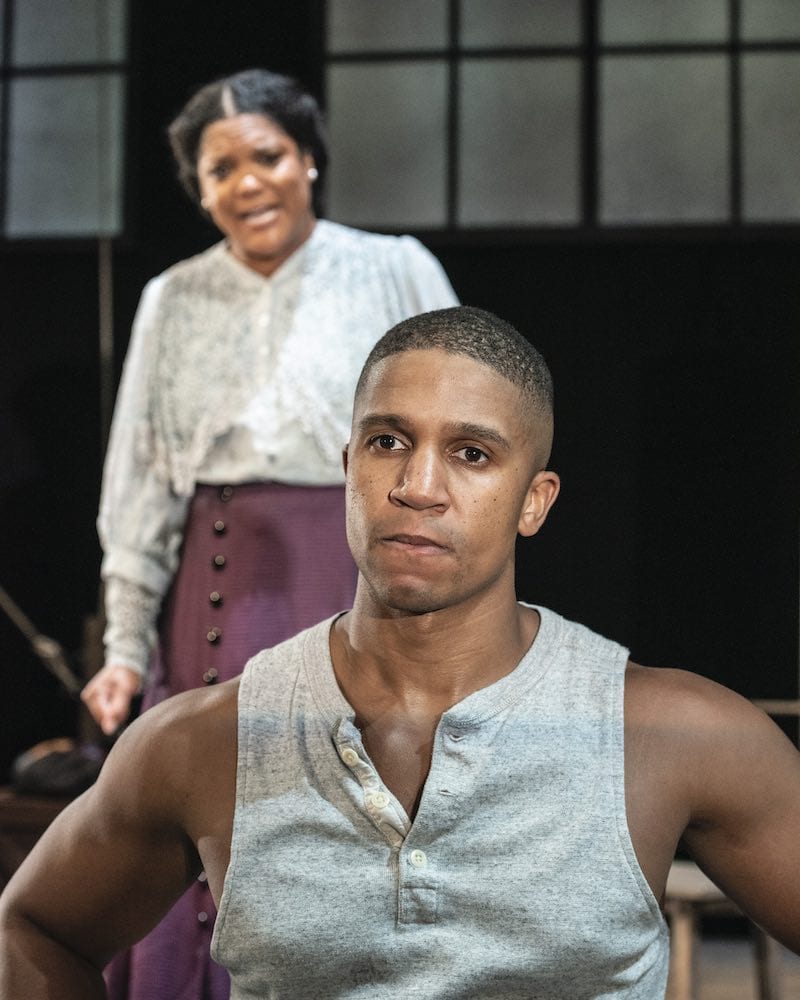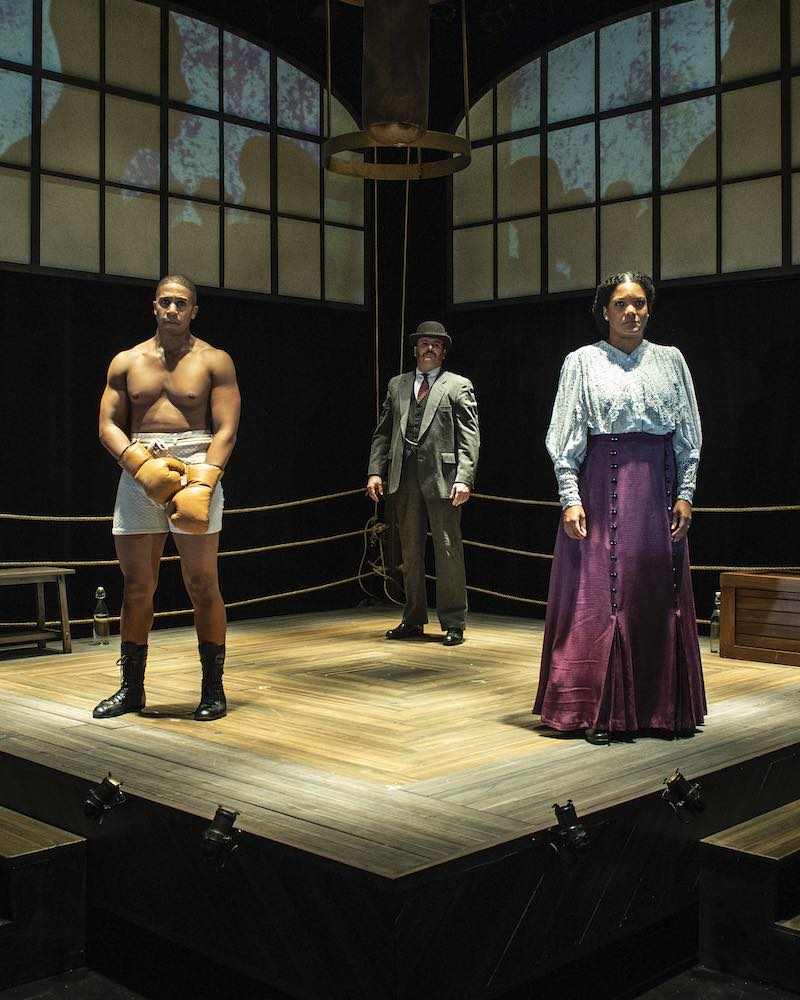This play about a boxer packs so many emotional punches into its compact six rounds, you might not know what hit you. As fists fly, bells clang, terse words burst, and the cast claps out each repercussion, you might feel the pace of your own pulse race. And even if the sport of boxing leaves you cold (as it does me), you might be moved to shed a tear and cheer.
Marco Ramirez’s The Royale was inspired by the life of African American heavyweight champion Jack Johnson, who is fictionalized as Jay Jackson. In Director Paige Hernandez’s award-magnet production (seen last fall at Olney Theatre Center and now running at 1st Stage), Jay is played by Jaysen Wright, who is giving a full-on physical, vocal, and passion-filled performance of the caliber and charisma that makes stars.

Also in the top-tier cast are James J. Johnson as Jay’s trainer, Clayton Pelham Jr. as Jay’s sparring partner, and Chris Genebach as Jay’s white promoter. They each have magnificently moving moments, but it was when Jay’s sister entered the story that I got totally knocked out.
The sister’s name is Nina. She and Jay grew up together but have not seen each other in years. She arrives by surprise to warn him of the deadly racist violence that is certain to ensue if he pursues his great hope of defeating the white man who is reigning heavyweight champion. Lolita Marie plays Nina with the starchy concern of a fierce older sister, and her foreboding is well-founded. Already at Jay’s matches, guns have been seized from angry white men. Nina knows that if Jay wins there will be loss. She accuses him of fighting for personal glory, because “he always wanted the apple at the top of the tree.”

At a point in the play, Jay appears to be boxing the white champion but that opponent is not there; Nina is in the ring instead. And their brother-sister confrontation—which is punctuated by rapid punches, shotgun dialogue, and a racket of claps—takes us deep into Jay’s heart and lays bare what drives him to box.
It’s not why Nina thinks. It’s not the motivation Jay’s trainer, promoter, or sparring partner might suppose. It’s not even anything like what makes a whole lot of men fight, whether in or out of the ring, which is basically the need to defend their manly honor by punching out another man’s lights. No, what’s driving Jay is something else altogether. And it’s heartstopping.
JAY [to Nina]: You remember that pharmacy on Colby Lane?… You remember how much you liked those posters they’d put out front?… Posters for toothpaste, Posters for perfume – … How much you liked those pretty ladies…
NINA: You’re outta your mind – …
JAY: Ain’t one o’ them looked like you – …
Jay is remembering something Nina does not want to think about. Jay is remembering her insecurity because she could not conform to white beauty standards. And in a chilling flashback, Jay tells Nina how he remembers her trying to straighten her hair:
JAY: Just a little boy, come lookin’ for his sister –
NINA: Stop it, Jay –
JAY: Ain’t but nine years old – … Just a little boy walkin’ up to a screen door, Smell of burning meat –
NINA: Jay I said stop –
JAY: Screaming –
NINA: Jay –
JAY: And he can see her, Sobbin’ on the kitchen floor, Hot iron in hand, Blood runnin’ down her neck, He can see his sister, He can smell her skin, He can smell the smoke that used to be her hair, … But she won’t open – … She won’t open – … She’s crouched and screaming and alone and there’s blood runnin’ down her neck but she won’t open so he pounds on that door, Nina – … He’s pounding that door down ’cause he wants to help her – …’Cause she was tryin’ to make herself look like them, Nina – … Tried so hard she made this mess of herself – ’Cause she ain’t never seen no posters looked like her….I’m standing at that screen, I’m pounding at that door, Where I always been, every minute, every day – … every punch I ever threw, Every punch I ever took. … I’m just tryin’ to fix that.…I’m still tryin’ to tell you – … I’ma make it right. … I’ma change things.
At that I lost it. I expected The Royale to be a play about men boxing. And it is. But this extraordinary writer, this amazing director, this incredible performance—never have I felt in theater such a poignant and powerful portrayal of a brother’s love for his sister.
Running Time: 75 minutes, with no intermission.
The Royale plays through February 23, 2020, at 1st Stage – 1524 Spring Hill Road, in Tysons, VA. Tickets can be purchased online or by calling the 1st Stage box office at 703-854-1856.
The Royal is a regional premiere co-production between Olney Theatre Center and 1st Stage.
‘RELATED: “The Royale’ Director Paige Hernandez talks boxing, hip hop, and the virtue of politeness”




